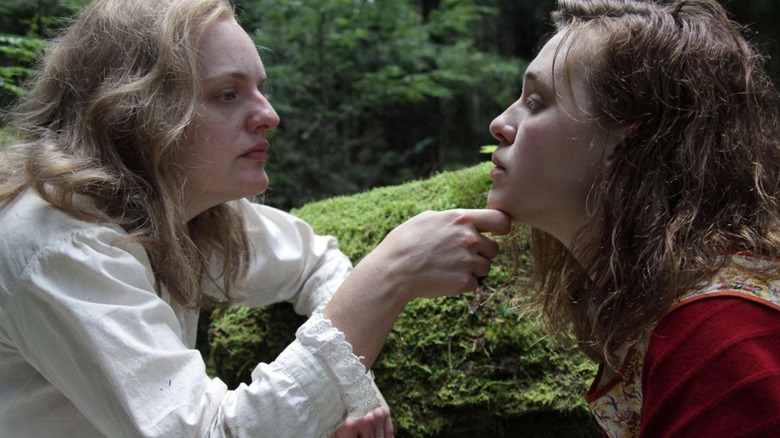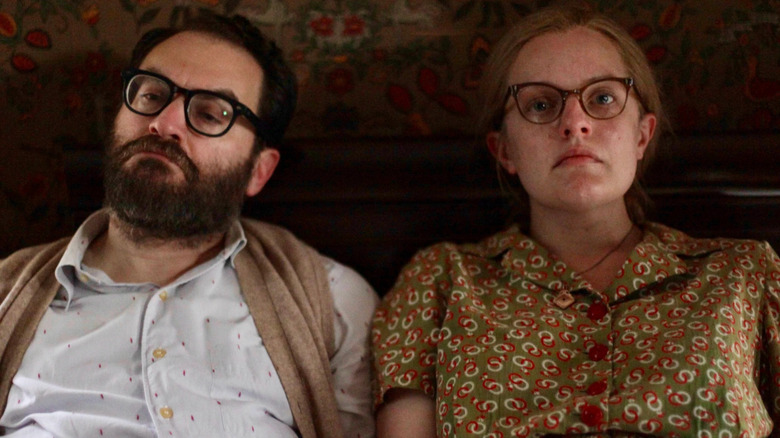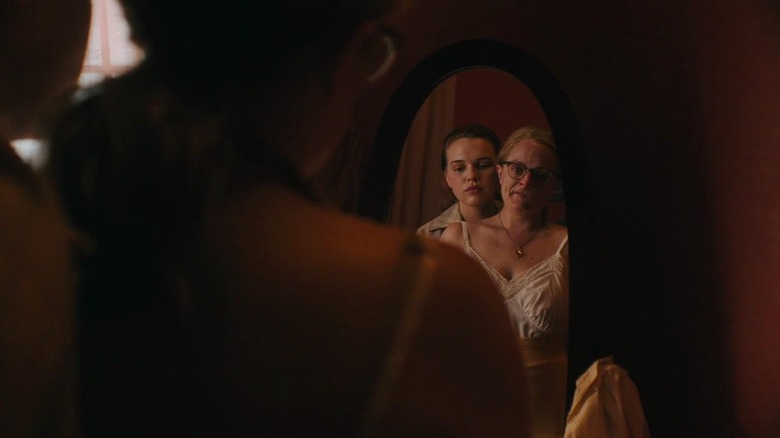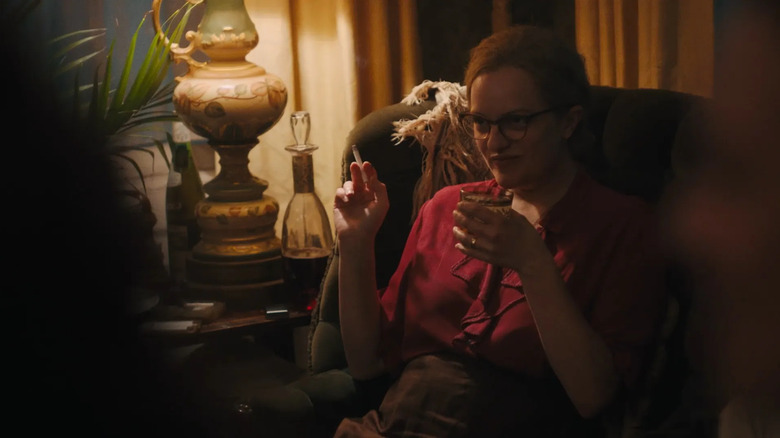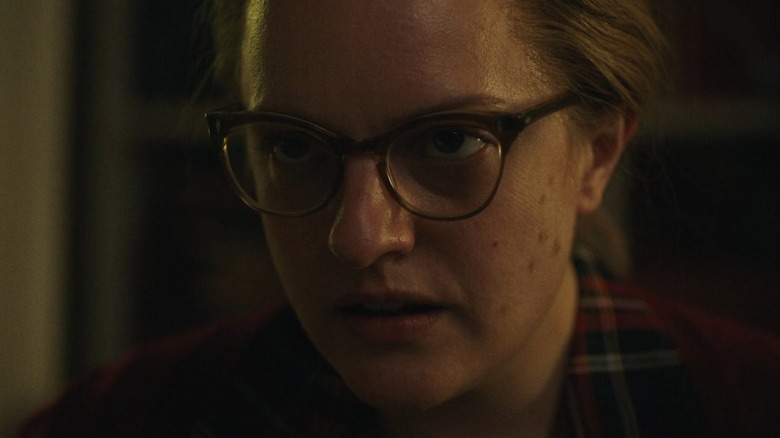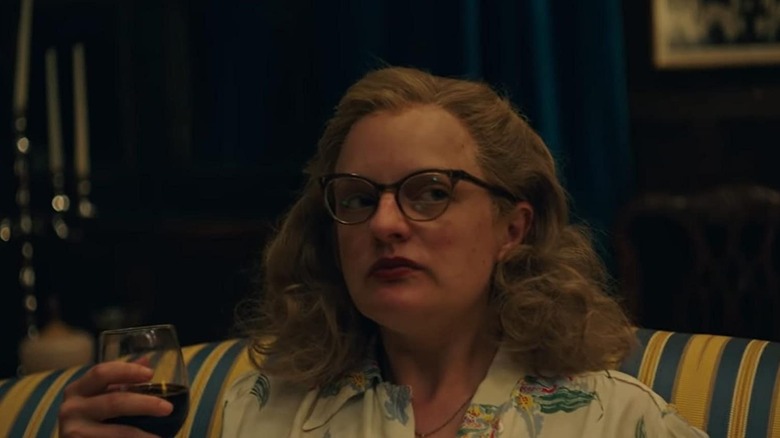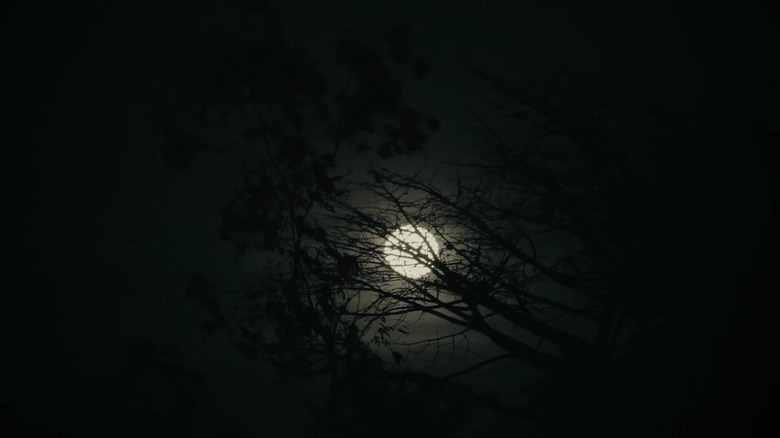Shirley Ending Explained: The Fiction, The Reality, And Everything In Between
Josephine Decker's 2020 film "Shirley" — based on the novel by Susan Scarf Merrell — is a biography of the legendary, and legendarily sour, horror author Shirley Jackson ... sort of.
Elisabeth Moss gives a truly great performance as Jackson, depicting her as a woman out of time, unwilling to play by the stuffy, sexist rules of "polite society." When a hen-like housewife peer of Jackson's whines that she might stain her couch with red wine, it's Jackson's instinct to upend her entire glass onto the upholstery. Jackson is depicted as cantankerous, lethargic, alcoholic, and mean.
"Shirley" centers on the relationship Jackson had with a wide-eyed college student named Rose Namser (Odessa Young), a young woman who is optimistic, happy in her new marriage, and eager to raise her unborn child. Jackson is childless and, as the film progresses, will reveal her resentment of that fact. Jackson is happy-ish in her marriage, as her husband, Stanley Edgard Hyman (Michael Stuhlbarg) admires her skill as a writer. Their marriage also appears to be open, as Stanley has multiple affairs and Shirley doesn't seem to much mind. Rose, meanwhile, has a new, squeaky-clean, traditional 1950s marriage to Fred (Logan Lerman). Rose is the opposite of Jackson.
Rose is also a fictional construct. Shirley Jackson never took in a lodger named Rose, and presumably never experienced foul bitterness toward an optimistic young student. Curiously, Shirley's life is explored largely from Rose's perspective, offering a perspective on Jackson's life that gives it undue coloring. Even more curiously, "Shirley" focuses on Jackson's childlessness as being an emotional sticking point for the author. In real life, Jackson already had children by the year the movie takes place.
The film, then, is highly fictionalized, and its ending accentuates a thematic point that wasn't, in reality, a concern to Jackson.
What you need to remember about the plot of Shirley
"Shirley" is a film about rivalry, resentment, and the stodgy 1950 academic systems that keep both women and intellectualism at bay. Rose is a student, eager to start her domestic life with Fred, newly a lecturer at the nearby Bennington College in Vermont. They need a place to stay, and they manage to find a room for rent in Shirley Jackson's house. Jackson is already something of a celebrity, having published her celebrated short story "The Lottery" a few years before. Shirley is hardly a stuffy 1950s housewife, however, and happily intimidates her new lodger with threats of witchcraft. Shirley is also an agoraphobe — a piece of the story that is actually true to Jackson's life — and has become almost bestial in her self-imposed isolation. Rose is enamored of Jackson, but intimidated by her forthright attitude.
Hyman, meanwhile, has adopted a lot of his wife's social tactics and seems to be deliberately discouraging the young Fred from advancing in his career. Hyman's resentment is clear, although he seems to be fueled by Shirley's overall resentment of the young couple ... and the rest of the world. Shirley becomes disturbed when she learns that Rose is pregnant, and the seething begins properly. This, however, is undergirded by a strong friendly, and definitely sexual attraction between the women. In real life, however, Jackson wasn't known to be queer.
Oh yes, and there's a mystery afoot. "Shirley" talks about the real-life disappearance of Paula Jean Welden in 1946. The disappearance was likely the inspiration for Jackson's 1951 novel "Hangsaman," and Rose begins to suspect that Hyman might have had something to do with it.
What happened at the end of Shirley?
By the end of the film, Rose becomes something of an echo of Shirley. After having her child, Rose finds that Fred might also be having affairs with students. Women, in the world of "Shirley," are meant to be broodmares and domestic laborers while their husbands have affairs. Jackson has found cynicism helps weather this system, and Rose begins to follow suit. Rose eventually wanders what might have been the same dark path the disappeared Paula wandered, symbolically vanishing into the woods. Rose would be another woman overwhelmed by the darkness. She changes her mind, though, having been inspired by Shirley to survive the sexism through tenacity, smarts, and bitterness. Righteous anger is a powerful survival tool.
The final scene of the film is Hyman and Jackson dancing together in their home. She has just finished writing "Hangsaman," and he loves it. They get back to their lives.
What has Josephine Decker said about the ending of Shirley?
Josephine Decker has said out loud in interviews that "Shirley" is not a truthful biography by any stretch. In a 2020 interview with Deadline, Decker even stated her intentions:
"We were not making a film that we ever thought, 'Oh, we're making a film about the real Shirley Jackson.' In fact, the script really meshed up a bunch of timelines in the real Shirley Jackson's life, so it absolutely was a fiction. None of the things that are in the film could have happened in real life because of just the way that the time worked out. [...] I think we were very clear that this is definitely a fictional person that we're creating. And so that gave us a lot more freedom."
The Shirley Jackson of "Shirley" is, then, a feminist ghost warrior, a spirit of rebellion, more than a known writer.
What did Shirley Jackson's son have to say?
The most curious addition Decker made was the resentment Jackson had toward Rose, largely because Rose was pregnant. Jackson hated the domestic trappings of 1950s America, and Moss gnashed through every scene in anger. Shirley insults people at the dinner table, behaving like, well, a character in a Shirley Jackson story. Decker's film is a meta-fiction, using modern Jackson as a means of injecting modern feminist resentment into the past. Through the fictionalized Shirley, 2020 sensibilities could fly in the face of oppressive systems that kept women at bay for far too long. This included bisexual underpinnings, as well as an aggressive ambivalence toward pregnancy. Fictional Shirley wanted children, but seemed to — in a thematic short of way — reject the idea of motherhood as being trite and gauche.
Especially baffled by the pregnancy ambivalence was Jackson's own son Laurence Jackson Hyman. Jackson and Hyman actually had four children, so the real-life author never possessed the same kind of wrathful resentment as depicted in the movie. According to Laurence, in an interview in the Press Democrat, his mother didn't behave the way she did in the film at all:
"The screenwriter and director were attempting to make a movie in which Shirley was like a character in one of her own stories. My mother would never have openly insulted someone at the dinner table, as she does in the movie. She was very proper. There are enough real facts in the movie to make you think it's a biopic. But then it diverges, becoming entirely fiction."
Although Jackson wrote several chilling horror stories like "The Lottery" and "The Haunting of Hill House," she was also a humorist and far better-natured than the way Moss depicts her.
Laurence, incidentally, was offered a job as a consultant on "Shirley," but he turned it down.
What has the cast and crew of Shirley said about the ending?
The idea of fictionalizing Jackson's life comes from, naturally, the Susan Scarf Merrell novel on which Decker's film is based. The Rose character was invented for that book, although Merrell has said in interviews that she hoped her book would, at the very least, be an accurate portrait of Jackson, even if it was historical fiction. Merrell once said to the Fiction Writer's Review:
"[... T]here's no getting around that I'm a maker up of stories. So after eight months of research for the biography, instead I started writing a memoir of me searching for answers to questions Shirley Jackson's work raises for many women about being a woman and a writer. That didn't feel quite right either. I wanted to write about why Jackson mattered, yes, but even more I wanted to use what I had learned from her work and from her life to create what I guess you'd call an homage to her."
Jackson's writing was so strong that even a biographer like Merrell had to write in her style. Merrell said in the same interview that the Rose character was ultimately her key to Jackson's life. In Merrell's book, the relationship between Jackson and Rose was friendlier, more platonic, and disappointingly not queer in the slightest.
Jackson was, in real life, a proponent of witchcraft, a hater of organized religion, and a feminist par excellence. She was not, however, a spirit of resentful rage as she was depicted in "Shirley." She was, by the accounts of non-fictional biographers, far more humane, if not terrifically spiky at times.
Shirley, you can't be serious
So who was the real Jackson, if not the spirit of righteous feminist indignation as she was depicted at the end of Decker's film?
Ruth Franklin's 2016 book "Shirley Jackson: A Rather Haunted Life" laid out Jackson a little more succinctly, and found the real story to be a little less lascivious or exciting. Jackson was still an outsider, but her oppression came from the Vermont Christian community in which she lived. Jackson's real life was less about indignation and more about the strain of keeping up appearances in the face of the 1950s U.S. and, of course, antisemitism. Franklin wrote:
"Look more closely, however, and Jackson's persona is much thornier. She was a talented, determined, ambitious writer in an era when it was still unusual for a woman to have both a family and a profession. She was a mother of four who tried to keep up the appearance of running a conventional American household, but she and her husband...were hardly typical residents of their rural Vermont town — not least because Hyman was born and raised Jewish."
Franklin continued:
"And she was, indeed, a serious student of the history of witchcraft and magic: not necessarily as a practical method of influencing the world around her (it's debatable whether she actually practiced magical rituals), but as a way of embracing and channeling female power at a time when women in America often had little control over their lives."
There was mysticism in Jackson's life more than wrath. Jackson died in 1965 at the age of 48. Her death was attributed to her chain-smoking and her use of prescribed barbiturates, considered a fine treatment for her agoraphobia. She wrote stories incessantly until her death.
